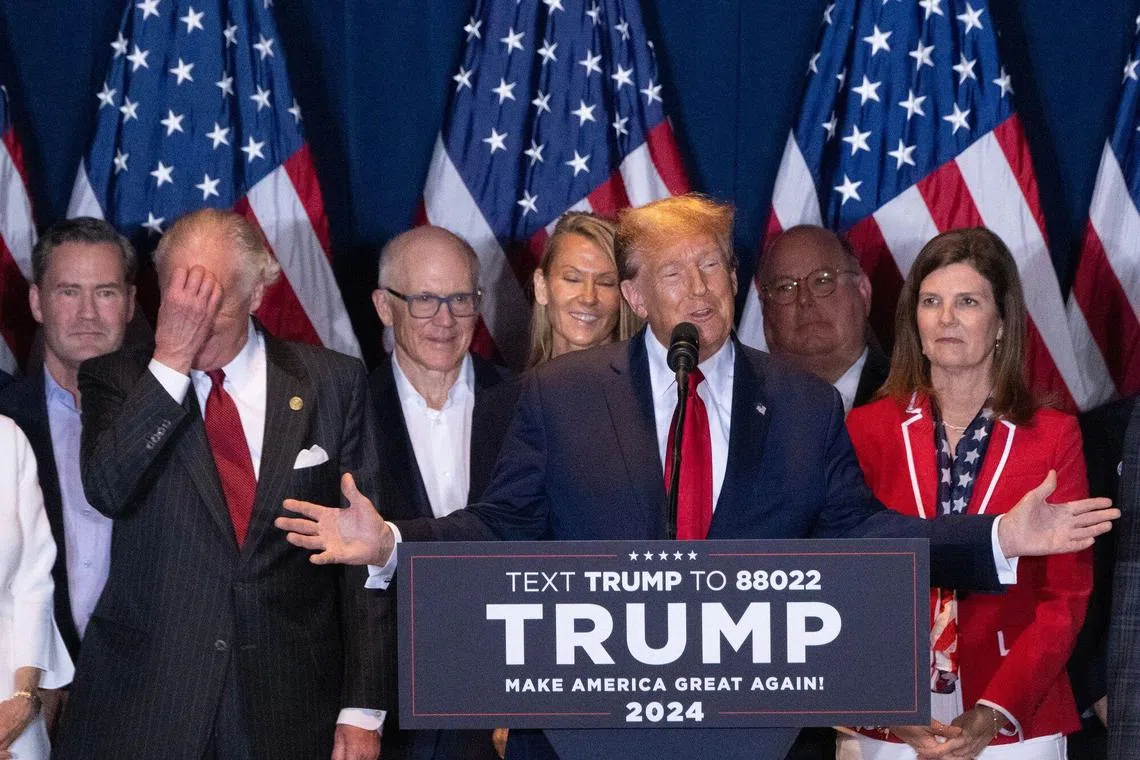Will Trump be knocked off US presidential election ballot by constitutional amendment?
Sign up now: Get ST's newsletters delivered to your inbox

Former US president Donald Trump speaking during an election night watch party at the South Carolina State Fairgrounds on Feb 24, 2024.
PHOTO: BLOOMBERG
Follow topic:
NEW YORK – The United States Supreme Court may soon decide whether a constitutional ban on insurrectionists holding political office bars Donald Trump from running for president again.
Two states have determined that a 19th-century amendment to the US Constitution renders Trump ineligible due to his connection to the Jan 6, 2021, assault on the US Capitol.
A larger number of states have ruled that the amendment’s so-called insurrection clause does not apply to Trump, who is the front runner for the 2024 Republican nomination even as he faces 91 criminal charges in four different cases, including one over his attempt to reverse his loss in the 2020 presidential election.
The dispute has reached the US Supreme Court, three of whose nine justices were appointed by Trump.
1. Where does this legal challenge stand?
On Dec 19, Colorado’s Supreme Court ruled 4-3 that the 14th Amendment makes Trump ineligible to return to the presidency
On Dec 28, Maine’s Secretary of State reached a similar conclusion. Courts or election officials in 10 other states had ruled in Trump’s favour as at Jan 31, according to the Lawfare blog.
In two of those states, Minnesota and Michigan, courts ruled Trump could be a candidate in the Republican primary but left open whether he would be eligible for the general election, should he be his party’s nominee.
2. Where is the challenge headed?
Trump asked the Supreme Court to overturn the Colorado ruling,
Although the three justices appointed by Trump during his 2017 to 2021 term – Mr Neil Gorsuch, Mr Brett Kavanaugh and Mrs Amy Coney Barrett – shifted the court sharply to the right, that has not translated into victories for Trump in his legal battles. Under Chief Justice John Roberts, the court repeatedly rejected Trump and his allies as they sought to overturn President Joe Biden’s election victory.
3. Why do two state determinations matter so much?
While being kept off the Republican primary ballot in two states is not necessarily fatal to Trump’s prospects, a Supreme Court ruling against him would give other states the go-ahead to similarly bar him from the ballot.
It would also raise questions about whether, should he be elected next November, he could legally take the oath of office and become president again in January 2025.
A decisive Supreme Court ruling in Trump’s favour, by contrast, would make him eligible for ballots nationwide and resolve the dispute over the 14th Amendment’s applicability to him.
4. What does the 14th amendment say?
Section 3 of the amendment says in part:
No person shall be a Senator or Representative in Congress, or elector of President and Vice-President, or hold any office, civil or military, under the United States, or under any State, who, having previously taken an oath, as a member of Congress, or as an officer of the United States, or as a member of any State legislature, or as an executive or judicial officer of any State, to support the Constitution of the United States, shall have engaged in insurrection or rebellion against the same, or given aid or comfort to the enemies thereof.
Passed by Congress in 1866 following the Civil War, and ratified by the requisite three-fourths of states two years later, the amendment extended rights and liberties to former slaves.
Section 3 was intended to disqualify anybody who had supported the secession of the southern states and the Confederacy they formed from returning to political office. Though the Amnesty Act of 1872 lifted that disqualification in most cases, Section 3, the so-called insurrectionist clause, remained on the books.
5. Has Section 3 been invoked since then?
According to the Congressional Research Service, Congress last used Section 3 in 1919 to refuse to seat Wisconsin socialist Victor Berger, accused of having given aid and comfort to Germany during World War I.
After his conviction for espionage was thrown out by the Supreme Court, Mr Berger was allowed to join Congress.
6. Does Section 3 apply to Trump?
The legal fights over Trump’s eligibility post a range of largely untested questions, including:
Whether Section 3 is “self-executing”. Trump has not been charged with insurrection, and Congress has not declared him an insurrectionist. There is disagreement over whether state election officials can invoke Section 3 in the absence of a court conviction or Congressional action.
Whether the 14th amendment applies to the presidency. Since Trump never held public office before winning the presidency in 2016, the only “previously taken” oath he took that would trigger the terms of Section 3 would have been as president. But experts debate whether the president is in fact an “officer of the United States” as meant by the Constitution. Some say the term applies only to people who are appointed rather than elected to their posts – such as ambassadors and judges.
Whether the Jan 6 attack was an “insurrection” that Trump “engaged” in. What to call the violent attack on the Capitol has been in dispute virtually since the day it happened. This semantic disagreement becomes an important legal one because Section 3 is premised upon “insurrection or rebellion”. Equally in dispute is how to characterise Trump’s role on Jan 6. Though he was not present at the Capitol, the attack followed a rally at which Trump repeated his false claims that the election had been fraudulently rigged against him by corrupt voting machine companies and Democrats. He told his supporters to “walk down to the Capitol” and “peacefully and patriotically make your voices heard”, but also exhorted them later: “If you don’t fight like hell, you’re not going to have a country anymore.” BLOOMBERG

